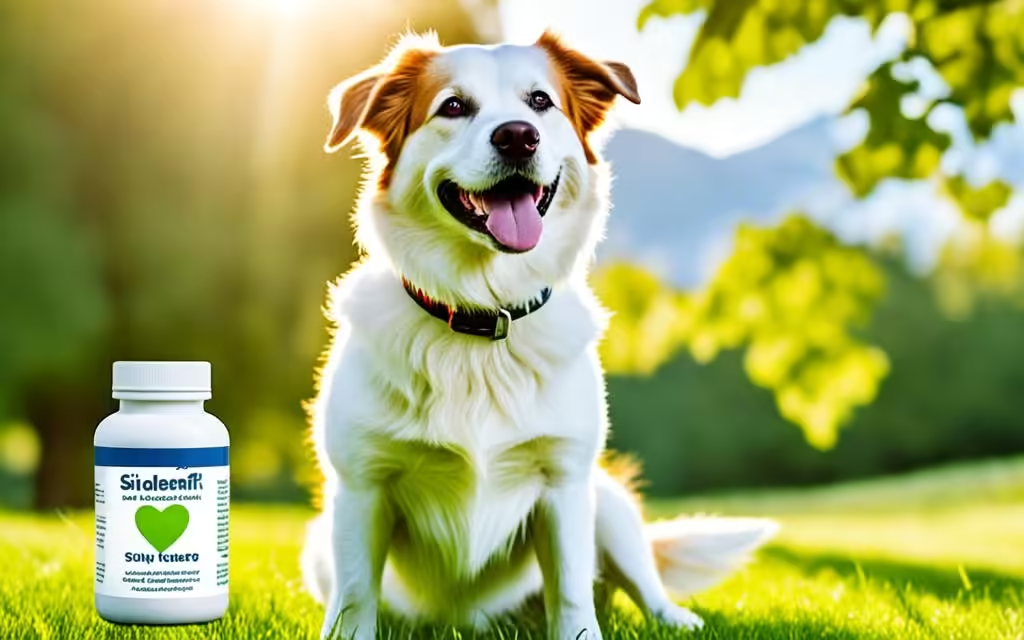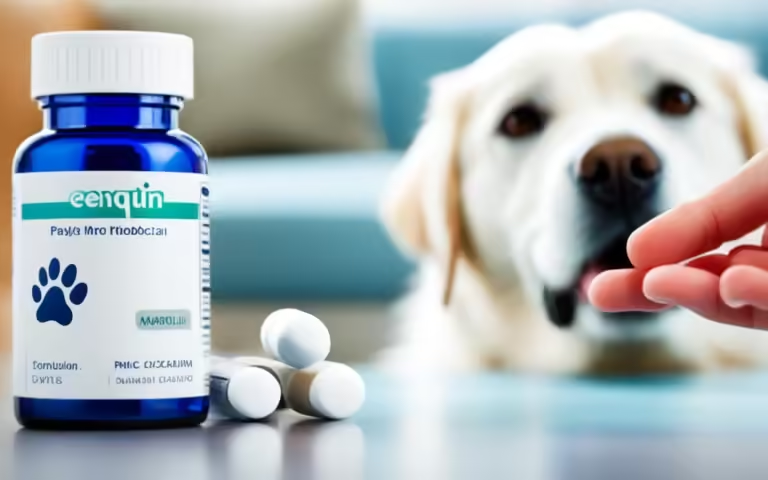Sildenafil for Dogs: Safe Canine Heart Medication
Vets often give dogs and cats Sildenafil for pulmonary hypertension1. This medicine, known as Viagra, Revatio, or Vizarsin, helps improve their energy and life quality1.
As a pet owner, knowing about Sildenafil is key. We’ll cover how to use it safely to keep your dog healthy and happy. This guide will give you the info you need to care for your pet well.
Key Takeaways
- Sildenafil is a common veterinary medication used to treat pulmonary hypertension in dogs and cats.
- The drug has been shown to improve energy, exercise tolerance, and overall quality of life in animals with this condition.
- Sildenafil requires a prescription from a veterinarian and is sold per tablet.
- The usual dosage range for dogs is 2.2-6.6 mg/lb taken 2-3 times daily.
- Reported side effects in dogs include gastrointestinal upset and skin redness or flushing.
Table of Contents
What is Sildenafil for Dogs?
Understanding the Drug’s Nature and Purpose
Sildenafil is a medicine that helps dogs and cats with heart and lung problems. These problems cause high blood pressure in the lungs, known as pulmonary hypertension2. This drug makes the muscles around small blood vessels in the lungs relax. This helps decrease the heart’s workload2.
Pulmonary hypertension means the blood pressure in the lungs’ arteries is too high. This makes the heart work too hard2. Sildenafil can lower this pressure, improve life quality, and increase survival time for dogs with this condition2. Dogs need 1 to 3 mg of sildenafil every 8 to 12 hours to treat this2.
Sildenafil also helps dogs with megaesophagus by reducing food regurgitation3. A study showed nine out of ten dogs ate better with sildenafil3. It helps open the lower esophageal sphincter, making eating easier3.
This drug is also good for puppies with congenital idiopathic megaesophagus4. A study of 21 puppies found it helped them eat better and gain more weight4. Lab tests showed it can relax the muscles in the esophagus4.
Sildenafil is a key medicine for dogs with breathing and digestive issues2. It’s versatile and effective, making it a top choice for pet owners and vets234.
Sildenafil for dog: Drug Information and Indications
Sildenafil is a key medication for dogs, helping with many health issues. It’s mainly used for treating pulmonary hypertension in dogs, especially in small and older breeds2. It also helps with megaesophagus and myxomatous mitral valve disease.
Studies show that sildenafil greatly improves life quality for dogs with pulmonary hypertension. It lowers blood pressure in the lungs, helps dogs exercise better, and can even make them live longer25. Dogs usually get 1 to 3 mg of sildenafil every 8 to 12 hours2.
Sildenafil isn’t FDA-approved for dogs but is made by special pharmacies2. Despite this, it has shown great results in many studies. Vets widely use it for treating dogs with pulmonary hypertension, megaesophagus, and heart issues.
| Condition | Sildenafil Use | Dosage | Outcomes |
|---|---|---|---|
| Pulmonary Hypertension | Primary treatment | 1-3 mg/kg orally every 8-12 hours | Decreased pulmonary arterial pressure, improved exercise capacity, increased survival time25 |
| Megaesophagus | Supportive treatment | Variable, based on individual patient needs | Improved symptoms and quality of life |
| Myxomatous Mitral Valve Disease | Supportive treatment | Variable, based on individual patient needs | Improved exercise tolerance and overall wellbeing |
Working with a vet is key when using sildenafil for dogs. It’s important to adjust the dosage and keep a close eye on the dog’s health5.

Sildenafil also has benefits for wound healing6. It helps wounds heal faster and improves skin flap survival in animals and humans6. The exact reasons for these effects are still being studied, but sildenafil’s potential in veterinary medicine is exciting.
Administering Sildenafil for Dogs
Dosage, Frequency, and Directions
Your vet will tell you exactly how to give sildenafil to your dog7. For dogs with high blood pressure in the lungs, the usual dose is 0.5 mg to 3 mg per kg every 8 to 24 hours7. For megaesophagus, give 1 mg per kg every 12 hours7. If you forget to give a dose, just give the next one when you remember, but don’t give two doses at once8. Sildenafil is usually given every 8-12 hours, based on the condition it’s for8.
Give sildenafil without food8. But, if your dog vomits or has stomach upset after taking it on an empty stomach, call your vet. They might suggest giving it with a little food8. If vomiting keeps happening, tell your vet right away8.
Sildenafil is a short-acting medication that stops working within 24 hours for most dogs.7 To make sure your pet gets the most out of the treatment, follow the dosage and frequency your vet says to8.
Remember8, sildenafil is often used in dogs for high blood pressure in the lungs8. In vet medicine, many drugs, like sildenafil, are used for certain conditions in animals8. By giving this medicine as your vet says, you can help your dog with their heart condition and make them feel better897.
Potential Side Effects and Precautions
Sildenafil for dogs is usually safe, but watch out for some side effects. These can include vomiting, diarrhea, less interest in food, and skin looking flushed, especially near the belly or groin10. Don’t use it on animals with low blood pressure, shock, blood loss, or heart or lung issues that won’t get better with this drug10.
Sildenafil is also in the drug Viagra, used for human erectile dysfunction11. Viagra helps improve blood flow to the male genital area11. But it doesn’t work on the brain and needs natural arousal for an erection11. While it’s a known treatment for men, it’s not meant for dogs because the effects and warnings are different.
Using this drug is only allowed by or under a vet’s order10. Always follow your vet’s advice and watch your dog for any bad reactions. If you see something that worries you, call your vet right away.
| Potential Side Effects of Sildenafil in Dogs | Precautions When Giving Sildenafil to Dogs |
|---|---|
| Vomiting Diarrhea Decreased appetite Flush red appearance to the skin | Low blood pressure Shock Blood or fluid loss Certain heart or lung problems |
Always be careful when giving your dog any medicine. Knowing the possible side effects and warnings of sildenafil helps keep your dog safe and healthy10.

In summary, sildenafil can be helpful for some dog health issues, but always talk to your vet and watch for any bad reactions. Being informed and active helps keep your pet safe and well10.
Drug Interactions and Monitoring
Medications and Follow-up Care
When giving sildenafil to dogs, it’s key to check with your vet about other meds your pet takes12. Don’t mix sildenafil with drugs that lower blood pressure, like nitrates or alpha-blockers13. Also, some meds like cimetidine or erythromycin might not work well with sildenafil.
Your vet might suggest special checks or tests if your pet is on sildenafil12. This is to make sure the medicine is working right and to adjust the treatment if needed.
| Medication | Interaction with Sildenafil |
|---|---|
| Nitrates, nitroprusside sodium, alpha-adrenergic blockers, amlodipine, and other hypotensive drugs | Sildenafil should not be used in conjunction with these medications as they can cause low blood pressure. |
| Cimetidine, erythromycin, clarithromycin, ketoconazole, itraconazole, phenobarbital, and rifampin | These medications may interact with sildenafil and should be discussed with your veterinarian. |
It’s vital to keep a close eye on your pet when they’re on sildenafil12. Your vet might suggest tests or checks based on your dog’s needs and other meds they’re on.
Tell your vet about all the meds and supplements your dog uses13. This helps your vet make the best choices for using sildenafil and watching how your pet reacts to it121413.
Storage and Overdose Concerns
When giving sildenafil to dogs, it’s important to store it right and know about overdose risks. The way you store this medicine depends on the strength or type given15. Always check the label or ask a vet or pharmacist for the right way to store it.
Usually, you should keep sildenafil at room temperature between 67-77°F (19-25°C)15. It’s okay if the temperature is between 59-86°F (15-30°C) for a short time. But, keep the container closed to keep moisture and light out15. For special sildenafil mixes, follow the pharmacy’s storage advice.
Sildenafil is approved for people under the names Viagra® and Revatio®, but not for pets15. Yet, some pets might get special mixes if they need something not covered by approved drugs16.
If a pet accidentally takes too much sildenafil, call a vet or the ASPCA’s Animal Poison Control Center right away15. Signs of too much include very low blood pressure, weakness, vomiting, fast heart rate, collapse, or feeling very tired15. If a person takes too much, call the National Capital Poison Center at 800.222.122216.
| Medication | Overdose Symptoms | Emergency Contact |
|---|---|---|
| Sildenafil (dogs) | Very low blood pressure, weakness, vomiting, high heart rate, collapse, or lethargy | Veterinarian or ASPCA’s Animal Poison Control Center (888.426.4435) |
| Sildenafil (humans) | Headache, nasal congestion, difficulty breathing, prolonged erection, dizziness | National Capital Poison Center (800.222.1222) |
In summary, storing sildenafil right and knowing about overdose risks is key when giving it to dogs. Talking to a vet or pharmacist for advice on storage and what to do in an emergency helps use this medicine safely and responsibly.
Sildenafil for Dogs: Comparing with Similar Drugs
Sildenafil is a top choice for treating pulmonary hypertension in dogs. Yet, it’s not the only option. Vets might also look at bosentan and tadalafil for these dogs17.
Sildenafil helps by making blood vessels in the lungs relax and widen. This makes it easier for the heart to pump blood through them17. Bosentan and tadalafil work differently but have similar effects on the lungs. The right drug depends on the dog’s health and the vet’s experience with each medicine.
| Drug | Mechanism of Action | Advantages | Disadvantages |
|---|---|---|---|
| Sildenafil | Vasodilator | Well-studied in veterinary medicine Effective in reducing pulmonary hypertension | Requires more frequent dosing (3 times daily) Short half-life in dogs |
| Tadalafil | Phosphodiesterase-5 inhibitor | Longer half-life, allowing for once-daily dosing Viable alternative to sildenafil | Less research in veterinary literature Potential for adverse events |
| Bosentan | Endothelin receptor antagonist | Different mechanism of action compared to sildenafil and tadalafil May be effective in certain cases of pulmonary hypertension | Limited data on use in dogs Potential for liver toxicity |
Sildenafil is the most studied for treating pulmonary hypertension in dogs17. But, tadalafil and bosentan could work too in some cases18. The choice depends on the dog and the vet’s advice.
Choosing the right medication should be done with a vet’s help. They can pick the safest and most effective treatment for the dog’s condition171918.
Benefits and Improvements in Quality of Life
Sildenafil is a key drug for dogs with lung problems20. It helps them feel more energetic and able to exercise. This makes them happier overall.
Studies show that adding ambrisentan to sildenafil helps dogs eat better and move more20. Using both ambrisentan and tadalafil together also lowers the chance of serious health issues in people and dogs20.
Sildenafil also helps dogs with megaesophagus eat better21. It makes it easier for food to go down. Owners saw less regurgitation and their dogs gained weight21.
Sildenafil helps dogs with lung issues breathe easier and move better22. It’s shown to be very helpful for dogs with megaesophagus and heart valve problems22. This shows how important sildenafil is for dogs’ health and happiness.
Enhancing Energy, Exercise Tolerance, and Wellbeing
Sildenafil makes blood vessels in the lungs relax. This helps the heart work less hard and improves blood flow20. It’s a big help for dogs with lung issues, making them more energetic and happy.
| Indicator | Improvement |
|---|---|
| Energy | Increased activity and improved appetite |
| Exercise Tolerance | Reduced respiratory distress and syncope during physical activity |
| Overall Well-being | Decreased clinical signs and improved quality of life |
“Sildenafil has been a game-changer for our dog with pulmonary hypertension. We’ve seen a remarkable improvement in her energy, stamina, and overall happiness since starting the medication.”
Research keeps showing how useful sildenafil is for dogs21. It makes dogs with different health problems feel better. This makes it a key tool for improving dogs’ lives202122.
Understanding the Drug’s Mode of Action
Sildenafil is a common drug for dogs that works in a special way. It stops an enzyme called phosphodiesterase type 5 (PDE5) from breaking down a molecule called cyclic guanosine monophosphate (cGMP)23. This lets cGMP build up, causing muscles to relax and blood vessels to widen in the lungs23.
This makes it easier for the heart to work and helps with a condition called pulmonary hypertension in dogs23. It also helps relax muscles in the esophagus, making it easier for dogs with megaesophagus to swallow24.
A study by Brown et al. (2010) showed that sildenafil helped dogs with high blood pressure in their lungs23. Kellum and Stepien (2007) looked at 22 dogs taking sildenafil for this condition23. Arita et al. (2013) tested imatinib, another drug, on dogs with high blood pressure in their arteries23.
Reinero et al. (2020) made guidelines for treating high blood pressure in dogs, using studies and advice from experts23. These guidelines show how important it is to know how sildenafil works and its role in treating dogs.
For dogs with megaesophagus, taking liquid sildenafil helped them swallow better for two weeks24. But, dogs with very severe megaesophagus didn’t get much better with the drug24.
Understanding how sildenafil works in dogs is key for vets. It helps them use the drug right and care for their patients better232425.
Conclusion
Sildenafil is a key medicine for dogs with heart issues like pulmonary hypertension and megaesophagus23. It helps by making blood vessels wider, which makes the heart work less hard and boosts circulation. This leads to more energy, better exercise ability, and a happier life for dogs26. Even though it’s not FDA-approved for pets, vets often use it because it’s safe and works well27. Owners should talk to their vets about how to give it, its side effects, and how it might interact with other medicines.
Studies show sildenafil is great for dogs with heart problems, like pulmonary hypertension23. It helps blood flow better and makes the heart work less hard. This means dogs can have more energy, enjoy exercise more, and feel better overall26. Pet pharmacies and vets often suggest it as an off-label treatment. It’s important to work with vets to use it safely and right.
In summary, sildenafil is a big help for dogs with heart issues27. By knowing how it works and how to give it, owners and vets can make dogs with heart problems feel better. This includes those with pulmonary hypertension, megaesophagus, and other heart problems.
FAQ
What is sildenafil and how is it used in dogs?
What conditions can sildenafil be used to treat in dogs?
How should sildenafil be given to dogs?
What are the potential side effects of sildenafil in dogs?
Are there any drug interactions or precautions to be aware of when using sildenafil in dogs?
How should sildenafil be stored for use in dogs?
How does sildenafil compare to other medications used to treat pulmonary hypertension in dogs?
What are the benefits of using sildenafil to treat dogs with heart and lung conditions?
How does sildenafil work to manage pulmonary hypertension and other conditions in dogs?
Source Links
- Sildenafil 20 mg Tablet (sold per tablet) | 1800PetMeds
- How I Treat: Pulmonary Hypertension – WSAVA2013
- Version of Viagra—Yes, That Viagra—Could Help Dogs Who Suffer From Harmful Esophagus Disorder
- Sildenafil – Canine-Megaesophagus: All About ME
- Sildenafil – an overview | ScienceDirect Topics
- No title found
- Sildenafil for Dogs: How Viagra Can Treat Megaesophagus – GoodRx
- Sildenafil | VCA Animal Hospitals
- Online Pharmacy
- Vedafil (Sildenafil) – Pet Direct
- Online Pharmacy
- Generic version of Viagra could be the long-waited remedy for dogs with megaesophagus
- Medication Interactions: Food, Supplements and Other Drugs
- Isosorbide Dinitrate Oral: Uses, Side Effects, Interactions, Pictures, Warnings & Dosing – WebMD
- Sildenafil for Dogs and Cats
- Uses, Dosage & Side Effects
- Clinical efficacy of tadalafil compared to sildenafil in treatment of moderate to severe canine pulmonary hypertension: a pilot study
- Clinical efficacy of tadalafil compared to sildenafil in treatment of moderate to severe canine pulmonary hypertension: a pilot study
- No title found
- Adjunct ambrisentan therapy had clinical benefits in 5 dogs with sildenafil-refractory pulmonary hypertension
- Viagra promising as treatment for canine eating disorder
- Retrospective evaluation of pimobendan and sildenafil therapy for severe pulmonary hypertension due to lung disease and hypoxia in 28 dogs (2007–2013)
- Short-term effects of sildenafil in the treatment of dogs with pulmonary hypertension secondary to degenerative mitral valve disease
- Study shows Viagra as promising treatment for canine megaesophagus
- Sildenafil improves heart rate variability in dogs with asymptomatic myxomatous mitral valve degeneration
- Frontiers | Sildenafil does not have a significant effect on the portal vein velocity, cross-sectional area, and congestion index in the dog
- Comparative single-dose pharmacokinetics of sildenafil after oral and rectal administration in healthy beagle dogs – BMC Veterinary Research







